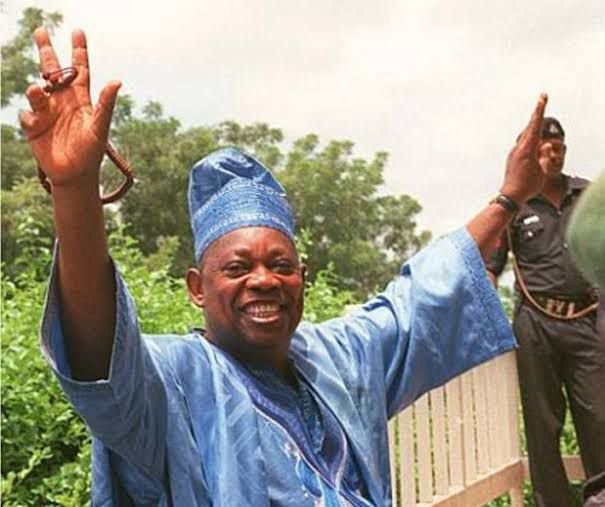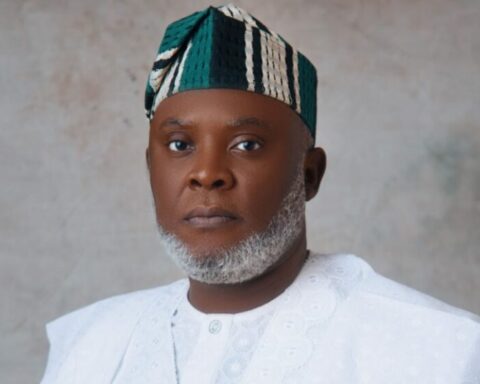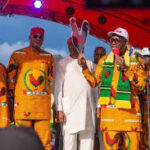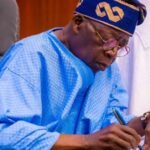Antjie Krog is a South African writer, academic and broadcaster. As a radio journalist with the South African Broadcasting Corporation, (SABC) Krog reported the Truth and Reconciliation Commission (TRC) proceedings under the chairmanship of Archbishop Desmond Tutu. Thereafter, she chronicled South Africa’s Apartheid regime’s human rights abuses and assassinations in a 1998 book entitled Country of My Skull. In that book, Krog attempted to define what she meant by ‘memorialisation’ as the remembrance and keeping memories of the dead and living victims of conflicts. Krog dramatises it as: “Beloved, do not die. Do not even dare to die! I, the survivor, I wrap you in words so that the future inherits you. I snatch you from the death of forgetfulness. I tell your story, complete your ending – you who once whispered beside me in the dark.”
As he appeared last week at the Joint National Assembly session on the 32nd anniversary of the June 12 election annulment, it was obvious President Bola Tinubu also aimed at memorialising heroes and victims of the June 1993 election annulment crisis. He, however, bungled it so irredeemably. And this was because he lacked an understanding of the concepts of remembrance; why remembrancers remember their dead and heroes and why memorialisation without memory of justice ends in failure.
When societies emerge from conflicts and violence like the Nigerian June 12 crisis, there are rituals usually made for healing of wounds. Honouring memories of the dead and the wounded living (emotionally, physically and psychologically wounded) is one of such. Erecting monuments to memorialise them is another. In some societies, native rituals are made to appease the roving spirits of the dead so as to ward off tragedies associated with shedding of innocent blood.
Apartheid South Africa and June 12 have so many features that unite and differentiate them. While Apartheid endured for 46 years, from 1948 to 1994, the crisis of Nigeria’s June 12 lasted from June 1993 to October, 1999. On one side, Apartheid was a system of institutionalised racial segregation and discrimination enforced by a white minority government, and on the other, June 12 was cobbled together by a tiny minority military Generals with deadly power of coercion.
Sergeant Barnabas Jabila, known by his alias of Sgt. Rogers, was a member of the Strike Force of the Gen Sani Abacha Presidential Body Guard. It was a specialised military squad deployed by former Chief Security Officer to Abacha, Major Hamza Al-Mustapha against opponents of that regime. Rogers reportedly confessed to having shot Alex Ibru, publisher of The Guardian on top of the Lagos Falomo Bridge on Friday, February 2, 1996. He also confessed to killing wife of MKO Abiola, winner of the June 12 election, Kudirat Abiola. While his bullets hit and killed the woman who later became a martyr of the struggle, Rogers’ bullets missed Ibru’s skull but hit him in the eye. For the 16 years he lived thereafter, Ibru was partially blind.
Ibru’s case was similar to Father Michael Lapsley’s. Born in New Zealand, Lapsley was trained as an Anglican priest in Australia and became a member of The Society of the Sacred Mission which in 1973 sent him to South Africa where he served as a university chaplain. The injustices of the Soweto massacre of 1976 where scores of students died made Lapsley subscribe to ANC ideals, a move which incensed the white minority rulers. The white government then refused to renew his visa, leading to Lapsley leaving for Lesotho and later Harare, Zimbabwe, where he served as ANC’s chaplain. However, on April 28, 1990, as he sat in his living room, Father Lapsley received two pieces of mails from South Africa. It was a correspondence ostensibly containing two religious magazines – one in Afrikaans, and the other in English. As he opened the English mail, the two, obviously twined, exploded. Like the parcel bomb that killed Dele Giwa in 1986, Lapsley’s was suspected to have been mailed by the South African Government’s covert security apparatus named Civil Cooperation Bureau.
Lapsley’s two hands were brutally wrung off by the bomb. Today, he uses prostheses in their place. He also lost one of his eyes like Ibru, as well as his ear drums which were shattered by the bomb. “I had accepted that I may die because of the side I had chosen, but not that I would have a major disability,” he says thereafter. “There was a short time when I wished I was dead, I had never met somebody else who had no hands so I did not think I would be able to live an active life again.”
As he walked into the venue of the Archbishop Desmond Tutu-led TRC, even Tutu smothered welling tears on seeing the mangled remains of Lapsley’s hands as they were held together by a pair of manacles-looking improvised hands. Asked if he had forgiven those who parcel-bombed him, Lapsley, who now believes in restorative justice, said he had, but wished to meet those who made him this miserable someday. “If I ever met them, I would ask: What do you do now? Do you still make letter bombs? If the answer is no, and in fact I help out at the hospital, or I do something to benefit others, then I (will) happily forgive them,” he replied.
In events after Gen Ibrahim Babangida annulled the June 12 election, Nigerians were subjected to horrendous and inhuman violence as we were in Pieter Willem Botha’s Apartheid. A rising tide of assassinations enveloped Nigeria like a miasma. Many of the unresolved assassinations of the period were that of Chief Alfred Ogbeyiwa Rewane, a nationalist, philanthropist and NADECO chieftain who was murdered in Lagos on October 6, 1995; Mr Femi Oyewo, Medical Director, Pfizer Plc., who was murdered on December 25, 1995 in Lagos; Mr Boniface David Izegwire, a retired Assistant Commissioner of Police, killed alongside his son, Mike Oshoike Begwire, in their residence at Ojodu, Ikeja on December 29, 1995; Mr Nurudeen Alowonle, a Lagos businessman and socialite, murdered in Abeokuta on January 9, 1996; Mr Kayode Awosanya, a public affairs officer to Mobil Producing Nigeria Ltd., who was assassinated in his residence at Idiyan Kelani Street, Iju Road, Oko-Oba, Lagos on January 20, 1996; Alhaja Kudirat Abiola, June 4, 1996; Chief (Mrs) Bisoye Tejuoso; the Iyalode of Egbaland, murdered in Abeokuta on September 19, 1996; Alhaja Suliat Adedeji, an Ibadan business tycoon, killed on November 14, 1996; George Idah, former Chairman of Oredo Local Government Area, killed in Benin, Edo State; Simeon Akpata; Tunde Ashafa, a pilot; Bishop Hayford Iloputaife, the Bishop and President of the New Generation Church; Mr and Mrs Funsho-George, both pastors and Alloy Uche George, a Lagos businessman. So many others who were murdered during this period.
The murder of Alhaja Suliat Adedeji was particularly pathetic. Assassinated in her Ring Road Kobomoje mansion, Adedeji was a philanthropist and fearless politician who had just returned from a long day of community meetings. The assassins walked into her living room, dragged her to her prayer room and shot her in her private part. The symbolism the murderers tried to convey by that gory killing is lost on all till today. Before joining politics, Adedeji was said to be a nurse. Unconfirmed rumours said she once attended to Gen Abacha and that the reason for her murder was hidden in those nurse-patient relationship. Chief Layi Balogun, said to be from the same Kobomoje family as Adedeji, was also assassinated not long after. Rumours were rife that Balogun was attempting to uncover what led to Adedeji’s murder. Till today, like all the above victims killed during the June 12 imbroglio, the killers of Suliat Adedeji and Balogun were never found. There was no justice nor closure.
the country abroad, there are laid down processes for doing that. It certainly cannot be done outside of the Nigerian Central Bank. I suggest that Mrs Maryam Abacha’s laughable defence of her husband’s blind looting of Nigeria’s patrimony should be pitied. It is the frustration of a woman feverishly attempting to rescue her husband’s name from the global Hall of Infamy. It won’t fly. She however may be excused for this laughable logic. Today, at the financial helm of affairs of this country is a known Abacha bagman who America held for helping Abacha siphon Nigeria’s wealth abroad. There are many villains of the June 12 who are leading lights of a government led by a man who fought Abacha. How then do you blame a dotting widow who just wanted to clean her husband’s mess? A national closure which includes revelations would have prevented this attempt to make a fool of Nigerians.
Follow us on all social media platforms @dailyquery for news and analyses around the globe.



























